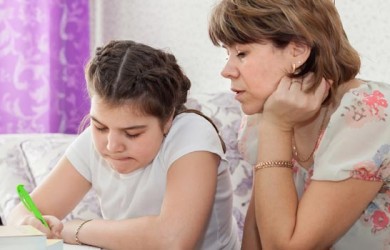4 Types of Parenting Styles and Their Effects on Child Development

 Listen to this article
Listen to this articleWouldn’t it be fantastic if the adorable little ones came with an instruction manual?
As first-time parents, we have so many questions and just as many worries about how to take care of our babies best. These worries do not end as babies progress to toddlers.
We research different parenting styles and ask our friends who have been there before us what their recommendations are. If you’ve Googled “Parenting styles psychology,” you know there is an information overload on this subject.
What is a parenting style?
Style, in general, is a very personal matter, and even more so when it comes to parenting. Along a continuum, there are probably as many different parenting techniques as there are parents.
However, there are some general characteristics and trends which can be identified to describe how parents tend to raise their children.
Factors that influence a parent’s style would include the way they were parented, as well as their personality, preferences, and choices. Also, there can be cultural as well as religious factors influencing a parenting style.
The four parenting styles that are commonly known today are based on the work of Diana Baumrind. She was a developmental psychologist at the University of California at Berkeley in the 1960s. Also, Maccoby and Martin significantly contributed by amending the model in the 1980s.
These four main types of parenting styles are generally known as authoritative, authoritarian, permissive, and neglectful.
There are significant differences between these four styles of parenting, and they have differing effects on the children who experience them.
Related Reading: How Raising Kids Today Is a Lot Different Than 20 Years Ago
Diana Baumrind’s parenting styles theory
Diana Baumrind is a researcher known for her look into parenting styles and their effects on children.
It was in the 1960s that Diana Baumrind observed that preschoolers showcased noticeably different types of behavior. Each type of behavior was significantly associated with a specific style of parenting.
Baumind’s theory elucidates that there is a strong correlation between the child’s behavior and the parenting style.
She has divided parenting styles into two dimensions of parenting.
- Parental responsiveness – a parenting style in which the parent responds to the needs of a child
- Parental demandingness – a parenting style in which the parent expects a child to be more responsible and mature.
Based on extensive study, Baumrind at first identified three parenting styles, namely:
- Authoritative parenting
- Authoritarian parenting
- Permissive parenting
And it was in the year 1983, Maccoby and Martin expanded this model, entailing three parenting techniques.
They extended the originally proposed permissive parenting style into two different types, namely:
- permissive parenting, which is also known as indulgent parenting style
- neglectful parenting, which is also known as the uninvolved parenting style
Related Reading: Common Parenting Issues and Ways to Deal With Them
What are the four parenting styles?
If you are a parent, you will know that parenting is probably one of the most challenging jobs you will ever have to do!
Inevitably individual personalities and circumstances will influence parenting techniques, which affects the children in different ways.
Nonetheless, here are discussed the four different styles of parenting that we talked about in the above section. You can see which of these describes you the best.
1. Authoritarian parenting style
Parents who use this style of parenting might be heard saying, “Children should be seen and not heard.”
These parents have low responsiveness and high demandingness. Their focus is on obedience and enforcing rules, and giving out punishments for breaking those rules.
They often do not consider the child’s feelings. Instead of teaching a child why something is wrong, they focus more on disciplining such mistakes.
Impact of authoritarian parenting on children:
Children of authoritarian parents are more likely to develop problems with self-esteem due to the low value of their opinion.
Children raised in an authoritarian parenting style may also become aggressive or hostile because they mirror their parent’s behavior. They may also become good liars in an effort to avoid punishment.
2. Authoritative parenting style
Not to be confused with authoritarian parenting, the authoritative parenting style takes the child’s feelings into consideration.
They have both high responsiveness and high demandingness.
Authoritative parents explain the reasons behind the rules. They still make it clear that the adults are in charge, but instead of punishments, they often rely on rewarding good behavior to raise their children.
Impact of authoritative parenting on children:
Children who are raised by authoritative parents often grow into adulthood as responsible adults who have no fear of expressing their opinions.
They are better at making decisions and evaluating risks on their own.
Related Reading: Authoritarian Parenting Behind Behavioral Problems in Kids
3. Permissive parenting
This type of parenting style is very lenient. It is a style of high responsiveness and low demandingness. While parents may set rules, they rarely enforce them.
Parents with this style will often only step in if there is a serious problem. They often adopt an attitude of letting kids be kids. They often take on more of a friend role than a parenting role.
Parents using this technique often don’t put much effort into discouraging poor decisions or bad behavior in their children.
Impact of permissive parenting on children:
Children raised with this type of parenting style are more likely to experience struggles when it comes to academics. They sometimes exhibit more behavioral problems and often have issues with authority and rules.
They often have low self-esteem due to a lack of boundaries and may report frequent feelings of sadness.
4. Uninvolved parenting
Out of the four different parenting styles, this style is a combination of low demandingness and responsiveness.
Parents with this parenting style tend not to have many rules. They may not give the child much guidance, nurturing, or parental attention.
They tend to expect children to raise themselves, devoting little time or energy to meet a child’s basic needs.
The uninvolved parent is not always intentionally uninvolved. Physical or mental health issues or simply the stresses of maintaining a job and a household may lead to this style of parenting.
Impact of permissive parenting on children:
Like the children of permissive parents, children of uninvolved parents tend to struggle with self-esteem issues and report high levels of unhappiness.
They also tend to perform poorly in school. Children of parents who use the uninvolved parenting style also tend to have higher instances of substance abuse.
Related Reading: Pros and Cons of Permissive Parenting
Parenting styles vs. parenting practices
We now know what exactly are the four styles of parenting. They represent how parents generally react to their children’s demands.
Parenting practices refer to parents’ distinct behaviors, while parenting styles refer to the broader patterns of the various parenting practices.
For example, let us consider two fathers, Jack and Mark, with the same parenting style- authoritarian parenting.
Now, Jack is someone who verbally abuses his son if he fails to follow his words. Jack won’t leave a single opportunity to reprimand his son in front of other people if his son fails to meet his expectations.
Mark, on the other hand, is a man of few words. But, if his children do not obey his set rules and fail to comply with his expectations, the children are grounded for inappropriately long periods. He cuts their allowances so that the children can suffer and remember that they mustn’t dare to disobey.
Both Jack and Mark follow different parenting practices, but both are undeniably authoritarian in nature. Both their kids are fearful of their fathers and suffer a low self-esteem, and have confidence issues, especially in social settings.
Also Try: How Compatible Are Your Parenting Styles Quiz
What is the best parenting style?
As per research, it can be said that the authoritative parenting style is the best amongst the four different styles of parenting. Authoritative parenting promotes close relationships.
Children of authoritative parents have reportedly shown the best behavioral, emotional, psychological, and academic development as compared to the children raised by authoritarian, neglectful, or permissive parents.
At the same time, it is important to note that different styles of parenting are appreciated in different cultures. Moreover, there are several good styles of parenting possible at a time.
It is important to remember that there can be some overlapping in the different parenting techniques, and one parent may use a mixture of styles at different times.
The parenting style incorporated by people is dependent on a lot of factors. You might be wondering how different parenting styles affect a child’s upbringing.
Basically, these different parenting techniques are well known to have a life-long impact on children. Let us look at an example in the following section to better understand the impact of parenting techniques.
Related Reading: How to Cope With Different Parenting Styles
Example of the impact of parenting style – Teens and vaping
Here is discussed the example entailing teens and vaping to understand the impact of parenting styles.
One worry of parents these days is the rise of vaping among teens. Recently, there has been a scare involving teens and adults getting sick due to vaping cartridges.
Though the Food and Drug Administration has linked the illness to black-market cartridges for vape pens and vape juice containing vitamin E oil, parents should be concerned about teen vaping.
How would the different parenting techniques work to address this problem with their children?
- The impact of permissive and uninvolved parenting
Let’s take the permissive and uninvolved versions first. Since both of these have low demandingness, they likely would not have a problem with teen vaping unless their children came to them with a problem.
The permissive parent might set some rules because they want to respond to needs, but the uninvolved parent wouldn’t care. In essence, they throw the responsibility onto the teen to make the decisions.
- The impact of authoritarian parenting
Although it may be tempting to take an authoritarian stance on vaping, research shows that the authoritative parenting style may be more successful. Yes, there are negative consequences, but taking a hard stance might make a teen hide their habit or fight back.
- The impact of authoritative parenting
An authoritative parent would explain that many teens become addicted to nicotine and are more likely to try analog cigarettes, as well as the health effects of nicotine over time.
From these examples, you can see that out of the different styles, the best style requires a lot of work both to enforce rules and to understand a child’s needs for guidance.
Related Reading: Positive Parenting Solutions
What is my parenting style?
After going through the four different parenting styles in detail, you surely must be wondering what your parenting style is.
Here’s a parenting styles quiz that will help you identify your own.
By knowing your parenting method, you can analyze its impact on your children. Also, you can try to make some positive changes in your style of parenting to raise your children in a healthy and balanced manner.
Despite your style of parenting, you can try to become more authoritative in nature to practice the necessary discipline and at the same time empower the children.
Children raised by parents using the authoritative parenting style tend to become emotionally resilient, empathetic adults with a higher sense of self-esteem and less incidence of depression.
Related Reading: Balancing Marriage and Parenting
Wrapping up
Now that you have a general overview of these four parenting methods, and if you have taken the quiz, perhaps you have recognized your parenting style.
Which one do you feel is the best? And are there any areas where you would like to make some adjustments to the way you are parenting?
Take some time to consider the effect you are having on your child and how you can adapt your behavior so that your child can thrive.
Don’t be afraid to ask for help as there is a vast array of resources available on good parenting styles, such as good books, websites, and counselors who can help you become the great parent that your child needs and deserves.
Remember, we are all on a learning journey, so keep refining your parenting style as you seek to be the best parent you can be for your child.
Also Watch:
 Tips
Tips
Write your tip or submit a video tip
All tips are reviewed before the publishing.
Share this article on
Want to have a happier, healthier marriage?
If you feel disconnected or frustrated about the state of your marriage but want to avoid separation and/or divorce, the marriage.com course meant for married couples is an excellent resource to help you overcome the most challenging aspects of being married.

























 We'd love your feedback!
We'd love your feedback! Thanks for your feedback!
Thanks for your feedback!
